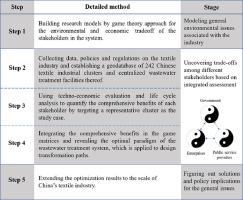Water Research ( IF 11.4 ) Pub Date : 2021-09-10 , DOI: 10.1016/j.watres.2021.117655 Yizheng Lyu 1 , Yingjie Liu 1 , Yang Guo 2 , Jinping Tian 3 , Lyujun Chen 3

|
Textile manufacturing poses pressing challenges on water sustainability characterized by intensive chemical consumption and waterborne pollution. Industrial clustering is a hallmark of textile industry development, featuring a two-stage wastewater treatment system consisting of in-plant and centralized treatment facilities. Driven by increasingly stringent wastewater discharge limits, three pillar stakeholders in textile industrial clusters, the local government, enterprises and environmental utility operators, seek for systematic countermeasures by balancing contradictory interests. This study presents a trilateral game model to uncover the economic and environmental tradeoffs among the three stakeholders targeting the optimization of wastewater systems. The model is solidified by a representative textile industrial cluster and is then extrapolated to 242 large-scale Chinese textile clusters to quantify the benefits. The key finds are (1) the in-use wastewater systems in many clusters function with low eco-efficiency; (2) the optimal paradigm is to adaptively leave room at half- to onefold for discharge limits from in-plant to centralized treatment facilities; (3) the environmental and economic benefits thereof are 24∼x223C61% and 6%, respectively, after retrofitting to the optimal paradigm for the Chinese textile clusters.











































 京公网安备 11010802027423号
京公网安备 11010802027423号